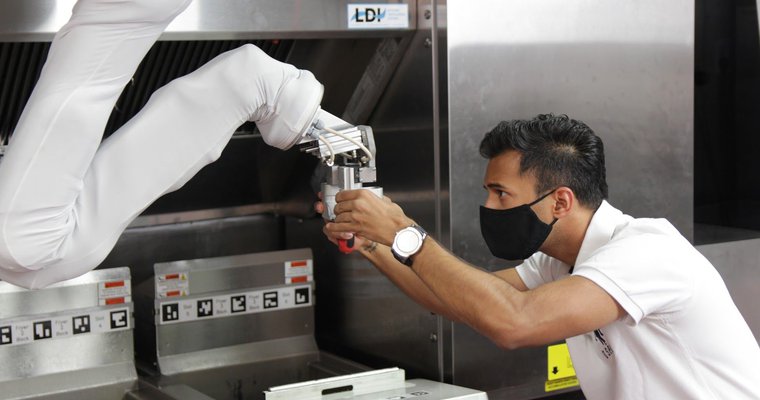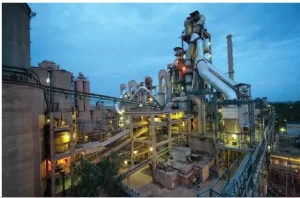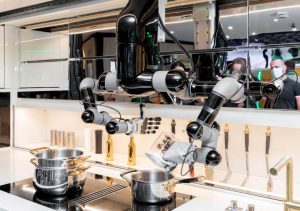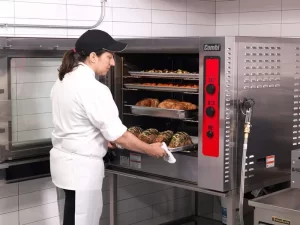The hospitality industry is no stranger to technological advancements, and the introduction of robotic kitchen assistants is the latest innovation transforming the culinary landscape. These robotic marvels are designed to streamline kitchen operations, enhance efficiency, and elevate the overall guest experience. As the demand for personalized service and faster dining options grows, robotic kitchen assistants are revolutionizing the hospitality industry, redefining the way food is prepared, cooked, and served. In this article, we will explore the benefits and applications of robotic kitchen assistants in the hospitality industry.
Understanding Robotic Kitchen Assistants
Robotic kitchen assistants are sophisticated machines that use artificial intelligence, sensors, and automation to perform various kitchen tasks. They can chop, slice, cook, mix, and even plate dishes with precision and consistency. These assistants are designed to work alongside human chefs, complementing their skills and augmenting kitchen operations, rather than replacing human expertise entirely. The integration of robotics in the culinary field allows chefs to focus on creativity, menu development, and customer interactions, while the robots handle repetitive and time-consuming tasks.
Benefits of Robotic Kitchen Assistants in the Hospitality Industry
- Enhanced Efficiency: Robotic kitchen assistants excel at repetitive tasks, such as chopping, stirring, and plating, performing them with precision and speed. This efficiency reduces preparation and cooking times, allowing hospitality establishments to serve more guests in a shorter period.
- Consistency in Quality: Robotic kitchen assistants deliver consistent results every time, ensuring that dishes are prepared with the same level of precision and attention to detail, regardless of the workload or kitchen staff.
- Labor Cost Savings: By automating certain kitchen tasks, robotic assistants can help reduce labor costs, allowing businesses to allocate resources to other areas of operations or invest in training and development for human staff.
- Time Management: Robotic kitchen assistants can multitask efficiently, enabling chefs to focus on complex cooking techniques, menu innovation, and customer engagement, ultimately improving the overall dining experience.
- Food Safety and Hygiene: Robots can maintain high standards of food safety and hygiene since they are not prone to human errors and can follow strict protocols for handling ingredients.
- Menu Diversity: With robotic kitchen assistants taking care of repetitive tasks, chefs can experiment with a broader range of ingredients and innovative recipes, expanding the menu offerings and attracting more diverse clientele.
- Customer Experience: Guests are often intrigued and fascinated by the presence of robotic kitchen assistants, making it a unique and memorable dining experience.
Applications of Robotic Kitchen Assistants in the Hospitality Industry
- Food Preparation: Robotic kitchen assistants can efficiently prepare ingredients, chopping vegetables, marinating meats, and even following specific recipes with exact measurements.
- Cooking and Grilling: Some robotic kitchen assistants are capable of cooking and grilling, ensuring precise temperature control and cooking times for consistent results.
- Plating and Presentation: Robotic kitchen assistants can artfully plate dishes, arranging ingredients with precision and creativity, enhancing the visual appeal of the final product.
- Bartending: In the realm of cocktails and beverages, robotic bartenders are becoming popular, mixing and serving drinks with flair and efficiency.
- Kitchen Cleaning: Robotic assistants can also be used for cleaning kitchen surfaces and floors, maintaining a clean and hygienic working environment.
Conclusionb
Robotic kitchen assistants are driving a significant shift in the hospitality industry, transforming commercial kitchens into hubs of innovation and efficiency. These cutting-edge technologies are streamlining kitchen operations, ensuring consistent quality, and offering new opportunities for culinary creativity. As the technology continues to evolve, robotic kitchen assistants will become more accessible and versatile, revolutionizing the dining experience for guests and redefining the role of chefs in the hospitality industry. With the perfect blend of human expertise and technological ingenuity, robotic kitchen assistants are leading the way towards the future of culinary innovation in the hospitality sector.






